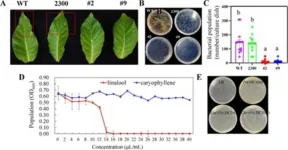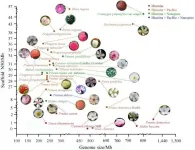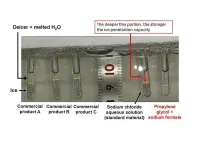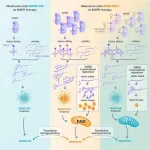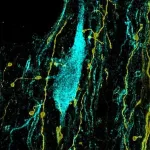(Press-News.org) A groundbreaking study has identified a gene that plays a dual role in enhancing both the aromatic compounds and disease resistance in lavender plants. The research uncovers how the LaMYC7 gene positively regulates the biosynthesis of linalool and caryophyllene, key for lavender's scent and its resistance to common plant pathogens.
Plants face various environmental pressures, including biotic stressors like pathogens and abiotic stressors such as extreme temperatures. Among biotic stressors, Pseudomonas syringae significantly threatens plant health worldwide. Terpenoids, including linalool and caryophyllene, play crucial roles in plant defense mechanisms against such stressors. However, the transcriptional regulation of these compounds remains less understood. Due to these challenges, there is a need to conduct in-depth research on the regulatory mechanisms underlying terpenoid biosynthesis.
Researchers from the State Key Laboratory of Plant Diversity and Specialty Crops at the Chinese Academy of Sciences have published a study (DOI: 10.1093/hr/uhae044) on February 6, 2024, in Horticulture Research. The study reveals that the LaMYC7 transcription factor in lavender significantly enhances the biosynthesis of linalool and caryophyllene, which boosts the plant's resistance to Pseudomonas syringae. This discovery not only sheds light on the transcriptional regulation of terpenoid biosynthesis but also suggests potential applications in developing disease-resistant lavender varieties.
The study used RNA-sequencing, transgenic technology, and enzyme assays to investigate LaMYC7's role in lavender. They found that LaMYC7 is highly expressed in glandular trichomes and responds to stresses like UV light, low temperatures, salt, drought, methyl jasmonate, and Pseudomonas syringae infection. Overexpressing LaMYC7 in Nicotiana increased linalool and caryophyllene content, enhancing terpenoid biosynthesis. LaMYC7 directly binds to the LaTPS76 promoter, boosting caryophyllene production. Additionally, linalool showed strong antimicrobial activity against Pseudomonas syringae. These findings suggest that LaMYC7 is crucial for plant defense, regulating terpenoid biosynthesis and enhancing pathogen resistance.
Dr. Lei Shi, the corresponding author of the study, stated, "Our findings provide valuable insights into the transcriptional regulation of terpenoid biosynthesis in lavender. The identification of LaMYC7 as a key regulator opens new possibilities for breeding lavender varieties with enhanced disease resistance and higher essential oil yields. This research underscores the importance of understanding plant defense mechanisms at the molecular level to develop sustainable agricultural practices."
The implications of this research are vast, offering potential applications in agriculture and the fragrance industry. By manipulating the LaMYC7 gene, breeders can develop lavender varieties with increased yields of valuable essential oils and improved resistance to diseases, contributing to sustainable crop production and opening new avenues for the utilization of lavender in various commercial products.
###
References
DOI
10.1093/hr/uhae044
Original Source URL
https://doi.org/10.1093/hr/uhae044
Funding information
This work was supported by the National Natural Science Foundation of China (grants 32300331 and 32270411), International Partnership Program of the Chinese Academy of Sciences (grant 063GJHZ2022038GC) and the Strategic Priority Research Program of the Chinese Academy of Sciences (grant XDA23080603).
About Horticulture Research
Horticulture Research is an open access journal of Nanjing Agricultural University and ranked number one in the Horticulture category of the Journal Citation Reports ™ from Clarivate, 2022. The journal is committed to publishing original research articles, reviews, perspectives, comments, correspondence articles and letters to the editor related to all major horticultural plants and disciplines, including biotechnology, breeding, cellular and molecular biology, evolution, genetics, inter-species interactions, physiology, and the origination and domestication of crops.
END
Lavender's secret: genetic regulator boosts plant health and fragrance output
2024-06-07
ELSE PRESS RELEASES FROM THIS DATE:
How $4 billion funded the unprecedented COVID-19 pandemic response
2024-06-07
New University of Virginia School of Medicine research is shedding light on how federal funding helped scientists understand the COVID-19 virus, develop new treatments and deploy lifesaving vaccines in record time.
The UVA Health researchers used advanced “machine learning” – a form of artificial intelligence – to analyze the thousands of scientific publications that resulted from the National Institutes of Health’s deployment of more than $4 billion to combat the pandemic. This analysis allowed the researchers to categorize the types ...
Advances in omics research of rosaceae
2024-06-07
A research team has provided a comprehensive overview of the applications of omics technologies in Rosaceae plants. The study highlights significant advancements in genome sequencing, transcriptome, proteomics, and metabolomics, shedding light on the genetic regulatory mechanisms underlying crucial traits such as flower color, fragrance, stress tolerance, and fruit quality. This research is invaluable for molecular breeding and improving economic traits in Rosaceae plants, potentially leading to the rapid cultivation of new varieties and germplasm.
The Rosaceae family, with its diverse species and economic importance, is a focus ...
Basic research: Inhibition of epigenetic control enzymes in immune cells as a potential new starting point in cancer immunotherapy
2024-06-07
Immunotherapy is one of the pillars in the fight against cancer and aims to enable the body's own immune system to fight a tumor. A recent study now shows that removing certain enzymes that regulate epigenetic processes from the so-called dentritic cells of the immune system influences their development and thus improves anti-tumor immunity. This finding could lead to new therapeutic strategies in immunotherapy. The study by Cristiano De Sá Fernandes from Maria Sibilia's research group at the Center for Cancer Research and the Comprehensive Cancer Center of MedUni Vienna and Vienna General Hospital was recently published in Cell Reports.
Cancer cells are the body's ...
Tracking greenhouse gas emissions in Chinese value chains with an interprovincial input–output model
2024-06-07
China’s economy has shifted from a stage of high growth to a stage of high-quality development, and the establishment of a dual-carbon target requires profound changes in the industrial structure and energy systems, as well as finding the right direction and pathway for industrial adjustment. While the potential for technological emission reduction continues to be released, the main factor affecting China’s carbon emissions is the speed and intensity of economic transformation and industrial restructuring.
A research team of Dr. GU Alun from Tsinghua University in Beijing, China, recently analyzed the correlations ...
Earth and space share the same turbulence
2024-06-07
Fukuoka, Japan—In a paper published in Geophysical Research Letters, researchers have discovered that the turbulence in the thermosphere exhibits the same physical laws as the wind in the lower atmosphere. Furthermore, wind in the thermosphere predominantly rotates in a cyclonic direction, in that it rotates counterclockwise in the Northern Hemisphere and clockwise in the Southern Hemisphere.
The findings reveal a new unified principle for the Earth’s varied environmental systems and can potentially improve future forecasting of both earth and space weather.
One time or another we’ve tuned in to see the latest weather forecast, and while ...
With programmable pixels, novel sensor improves imaging of neural activity
2024-06-07
Neurons communicate electrically so to understand how they produce brain functions such as memory, neuroscientists must track how their voltage changes—sometimes subtly—on the timescale of milliseconds. In a new paper in Nature Communications, MIT researchers describe a novel image sensor with the capability to substantially increase that ability.
The invention led by Jie Zhang, a postdoctoral scholar in The Picower Institute for Learning and Memory lab of Sherman Fairchild Professor Matt ...
Frozen? Let it melt with efficient new deicer friendly to the environment
2024-06-07
The dangers of frozen roads, airplane engines, and runways are well known, but the use of commercial products often means short-term safety over long-term environmental degradation. Seeking a better product, Osaka Metropolitan University researchers have developed a deicing mixture offering higher performance than deicers on the market while also having less impact on the environment.
The team, made up of graduate student Kai Ito, Assistant Professor Arisa Fukatsu, Associate Professor Kenji Okada, and Professor Masahide Takahashi of the Graduate School of Engineering, used machine learning to analyze ice melting mechanisms of aqueous solutions of 21 salts and 16 organic ...
Aging speeds up and lifetime becomes shorter in animals whose cells ‘believe’ to have too many nutrients, despite following a normal diet
2024-06-07
Cells are signalled to have nutrients in excess, and this leads to malfunction and inflammation in organs such as the pancreas, the liver and the kidneys.
The finding, by CNIO researchers, are published in Nature Aging. It suggests that an intervention on the inflammation alone can relieve symptoms and increase survival.
The research has been conducted on animal models, but comparing their molecular processes with blood samples from people in their seventies indicates that they can be extrapolated to human aging.
The reality of a population who is ageing at an accelerated rate makes it a priority to understand what happens in the body over time, ...
Transfer RNAs at the heart of therapeutic resistance
2024-06-07
An international research team led by scientists from the University of Liège has discovered an interesting new therapeutic target for the treatment of melanoma resistant to targeted therapies. Inhibition of the VARS enzyme could prevent this therapeutic resistance by resensitising tumours resistant to these targeted therapies.
Melanoma is one of the most serious and aggressive forms of skin cancer. When diagnosed early, melanoma is surgically removed. However, once metastases (i.e. secondary distant tumours) have developed, ...
Brain circuits underlying learning from negative experiences
2024-06-07
‘I’m not gonna do this again’, we often say when faced with negative feedback, adverse effects, or disappointing outcomes. Thus, we attempt to learn from such negative experiences. This principle is also a cornerstone of our education system: failing an exam ought to encourage students to do better next time.
How does the brain achieve this type of learning? Positive and negative reinforcement appear as two sides of the same coin in parts of the brain’s valuation system. Notably, some neurons that release the neuromodulator ‘dopamine’ represent outcomes better vs. worse ...
